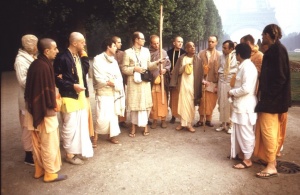CC Adi 13.115: Difference between revisions
No edit summary |
(Vanibot #0054 edit - transform synonyms into clickable links, which search similar occurrences) |
||
| Line 19: | Line 19: | ||
<div class="synonyms"> | <div class="synonyms"> | ||
''bhakṣya'' | ''[//vanipedia.org/wiki/Special:VaniSearch?s=bhakṣya&tab=syno_o&ds=1 bhakṣya]'' — foods; ''[//vanipedia.org/wiki/Special:VaniSearch?s=bhojya&tab=syno_o&ds=1 bhojya]'' — fried foods; ''[//vanipedia.org/wiki/Special:VaniSearch?s=upahāra&tab=syno_o&ds=1 upahāra]'' — presentation; ''[//vanipedia.org/wiki/Special:VaniSearch?s=saṅge&tab=syno_o&ds=1 saṅge]'' — along with her; ''[//vanipedia.org/wiki/Special:VaniSearch?s=la&tab=syno_o&ds=1 la]-[//vanipedia.org/wiki/Special:VaniSearch?s=ila&tab=syno_o&ds=1 ila]'' — took; ''[//vanipedia.org/wiki/Special:VaniSearch?s=bahu&tab=syno_o&ds=1 bahu] [//vanipedia.org/wiki/Special:VaniSearch?s=bhāra&tab=syno_o&ds=1 bhāra]'' — many packages; ''[//vanipedia.org/wiki/Special:VaniSearch?s=śacī&tab=syno_o&ds=1 śacī]-[//vanipedia.org/wiki/Special:VaniSearch?s=gṛhe&tab=syno_o&ds=1 gṛhe]'' — in the house of mother Śacī; ''[//vanipedia.org/wiki/Special:VaniSearch?s=haila&tab=syno_o&ds=1 haila]'' — was; ''[//vanipedia.org/wiki/Special:VaniSearch?s=upanīta&tab=syno_o&ds=1 upanīta]'' — carried; ''[//vanipedia.org/wiki/Special:VaniSearch?s=dekhiyā&tab=syno_o&ds=1 dekhiyā]'' — seeing; ''[//vanipedia.org/wiki/Special:VaniSearch?s=bālaka&tab=syno_o&ds=1 bālaka]-[//vanipedia.org/wiki/Special:VaniSearch?s=ṭhāma&tab=syno_o&ds=1 ṭhāma]'' — the feature of the child; ''[//vanipedia.org/wiki/Special:VaniSearch?s=sākṣāt&tab=syno_o&ds=1 sākṣāt]'' — directly; ''[//vanipedia.org/wiki/Special:VaniSearch?s=gokula&tab=syno_o&ds=1 gokula]-[//vanipedia.org/wiki/Special:VaniSearch?s=kāna&tab=syno_o&ds=1 kāna]'' — Lord Kṛṣṇa of Gokula; ''[//vanipedia.org/wiki/Special:VaniSearch?s=varṇa&tab=syno_o&ds=1 varṇa]-[//vanipedia.org/wiki/Special:VaniSearch?s=mātra&tab=syno_o&ds=1 mātra]'' — only the color; ''[//vanipedia.org/wiki/Special:VaniSearch?s=dekhi&tab=syno_o&ds=1 dekhi]'' — seeing; ''[//vanipedia.org/wiki/Special:VaniSearch?s=viparīta&tab=syno_o&ds=1 viparīta]'' — opposite. | ||
</div> | </div> | ||
Latest revision as of 18:23, 19 February 2024

A.C. Bhaktivedanta Swami Prabhupada
TEXT 115
- bhakṣya, bhojya, upahāra, saṅge la-ila bahu bhāra,
- śacī-gṛhe haila upanīta
- dekhiyā bālaka-ṭhāma, sākṣāt gokula-kāna,
- varṇa-mātra dekhi viparīta
SYNONYMS
bhakṣya — foods; bhojya — fried foods; upahāra — presentation; saṅge — along with her; la-ila — took; bahu bhāra — many packages; śacī-gṛhe — in the house of mother Śacī; haila — was; upanīta — carried; dekhiyā — seeing; bālaka-ṭhāma — the feature of the child; sākṣāt — directly; gokula-kāna — Lord Kṛṣṇa of Gokula; varṇa-mātra — only the color; dekhi — seeing; viparīta — opposite.
TRANSLATION
When Sītā Ṭhākurāṇī came to the house of Śacīdevī, bringing with her many kinds of eatables, dresses and other gifts, she was astonished to see the newborn child, for she appreciated that except for a difference in color, the child was directly Kṛṣṇa of Gokula Himself.
PURPORT
A peṭāri is a kind of big basket that is carried in pairs on the ends of a rod balanced over the shoulders. The man who carries such a load is called a bhārī. This system of carrying luggage and packages is still current in India and other oriental countries, and we have seen that the same system is still current even in Jakarta, Indonesia.